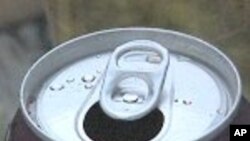Sugary soft drinks are coming under fire from health experts and government officials, who blame them for making people fat. While millions of people around the globe continue to purchase and enjoy the sweet, carbonated beverages, others have come to see them as a health hazard.
In the United States, experts are careful not to put all of the blame for the nation's expanding waistlines on the consumption of just one food item. But they say about half of the recent increase in Americans’ caloric intake comes from liquids, and primarily sweetened beverages.
Soft drinks, at least the non-diet variety, are loaded with calories. Some brands contain as much as 83 g of sugar in one serving.
The U.S. National Soft Drink Association acknowledges that people drink huge amounts of their products. The association says the biggest consumers of soda are young males, who drink, on average, nearly two liters each day.
SUGARY CALORIES CAN MAKE YOU FAT
Diets high in sugary drinks are linked to obesity, which in turn is linked to a number of serious diseases such as diabetes, high blood pressure, heart disease and stroke.
Some medical experts say nearly two thirds of Americans are already overweight. They predict that more than a quarter of the public could soon be become obese if the trend continues. (Obesity is roughly defined as being 13 kg heavier than one's expected weight)
In the face of such facts, government and school officials, as well as medical associations are becoming more aggressive in their opposition to soft drinks.
Already, many schools in the U.S. have banned or restricted the sale of soda. According to researchers hired by The Alliance for a Healthier Generation, the campaign resulted in a 65% reduction in shipments of full-calorie soft drinks to schools from 2007 to 2008.
In August, the American Heart Association issued a recommendation that Americans significantly reduce their intake of sugar. The new recommended maximum sugar intake is 44g daily. That's less than the amount of sugar found in one can of Coke or Pepsi.GOVERNMENTS TAKE ACTION
Government leaders across the country are beginning to propose new taxes on the popular beverages.
California state senator Alex Padilla, who chairs his state's Select Committee on Obesity and Diabetes, plans to hold hearings in November on the link between soda consumption and obesity. In San Francisco, Mayor Gavin Newsom says he will propose legislation that would impose a fee on stores that sell sugary beverages. Newsom calls soft drinks "the new tobacco,” saying they have joined cigarettes in the pantheon of dangerous health hazards.
DOCTORS TAKE AIM AT SODA
The medical establishment in the United States seems to be lining up solidly behind the idea that the consumption of sugary soft drinks should be discouraged through taxation.
The American Medical Association (AMA) has called for a tax on the sweeteners used in soft drinks with the money going to pay for a public health education campaign.
The New England Journal of Medicine, wants a tax on each purchase of any beverage that has added caloric (non-diet) sweetener. The tax would raise the cost of a bottle of soft drink by 15-20 percent, but reduce by 10% the nation’s caloric intake from sweetened beverages.
Although the Obama administration has not officially come out in favor of a such a tax, Dr. Thomas Frieden, Director, U.S. Centers for Disease Control, openly favors it. Sweetened beverages “play a significant role in the obesity epidemic,” Frieden says.
The New York Times newspaper recently quoted soft drink industry spokesman Kevin W. Keane as denying that soda alone is responsible for the nation's obesity problem. He calls obesity a complex problem and questions whether taxing the beverages would help.
With all of the bad publicity, the soft drink industry has seen a decline in sales beginning in 2005 and in each following year.
Products popular with the public have come under government fire before. In the last century, scientific studies demonstrated that smoking was harmful to people’s health. The U.S. government restricted the sale of tobacco and put high taxes on cigarettes to discourage people from smoking. Some are wondering if sugary soft drinks are about to get similar treatment.




